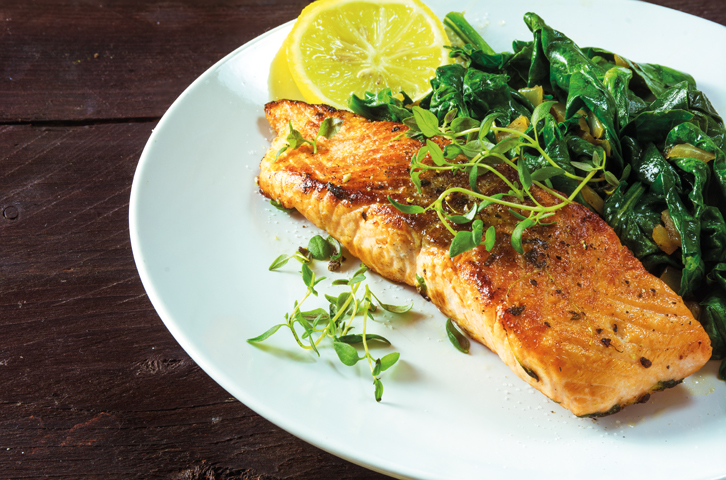
In light of a recent report suggesting we need to start viewing fatty foods in a more positive light, we asked two experts what diet is best for runners: one that is high in fat and low in carbs, or one that is high in carbs and low in fat.
Fat’s fantastic
Patrick Davitt is an assistant professor in Exercise Science at Mercy College, New York, and an advocated of high-fat, low-carb diet.
Low-carb diets have increased in popularity over the past couple of years. Do you think they are the best approach for endurance athletes?
I would not go so far as to say that it is the best approach for all endurance athletes, but it can be a wonderful approach for many, if not most. The majority of endurance athletes rely too heavily on using carbohydrates for energy, especially through sports drinks, gels and bars. People have been taught to fear fat, but this is changing as more people recognise it as great source of energy for endurance exercise.
Lots of runners are now being encouraged to try to burn fat, rather than carbohydrate, as fuel. Is this sound advice?
Yes. Fat is a wonderful fuel to burn under most conditions. At rest, we burn almost exclusively fat. Under lower intensity (walking), moderate intensity (jogging) and even higher intensity (running) exercise, it would be a great thing to rely more heavily on using fat to fuel your muscles. Carbohydrate as a fuel should only be needed for your extremely intense, explosive and powerful movements, such as lifting heavy weights and sprinting.
How does fat compare to carbohydrate as a fuel?
It has more than twice as many calories per gram, and is found in a 40-fold greater abundance within the body, but it is a slower-burning fuel. Research indicates that the limits to burning fat are found primarily at the site of the muscles themselves and this is where the concept of ‘adaptation’ comes to light. The body simply needs adequate time to become more efficient at burning fat as fuel.
What kind of diet would you recommend runners to follow?
If they were to consume a low-carbohydrate/high-fat (LCHF) diet, I would start making the switch during the ‘off-season’, as the adaptation period can take at least six weeks. My big recommendation would be for a runner to try it, but it’s important to find the right resources so that they are consuming a well formulated diet and not just winging it.
What kind of mid-race fuel would you recommend to runners?
For half-marathon distances or greater, nut butters are a good option. A pre-race meal might consist of eggs, nuts, bacon and maybe sweet potatoes or yams. All of this is trial and error, as stomach problems tend to be what make or break an endurance runner’s race day. The good news, though, is that most runners who follow a well-formulated LCHF diet report very little stomach distress – another reason to try it out!
carbs are king
Asker Jeukendrup, a nutrition expert who’s worked with Haile Gebrselassie, says carbs still have a role to play.
Low-carb diets have increased in popularity over the past couple of years. Do you think they are the best approach for endurance athletes?
There is definitely a lot of talk about these diets, but there is no evidence that there are any performance benefits [from a low-carb diet]. However, there is evidence that high-intensity work suffers as a result of going low-carb.
Lots of runners are now being encouraged to try to burn fat, rather than carbohydrate, as fuel. Is this sound advice?
Having an ability to burn fat is important, and it can come as a side effect of training. Training increases mitochondrial density and this improves the ability to use more energy and produce more power. The capacity to burn fat and carbohydrate increases as a result. It is also possible to increase fat oxidation by depriving the body of carbohydrate. The body then has no other choice than to use fat. The biggest problem I can see, however, is that if you do this too much you will improve your ability to burn fat but decrease your ability to use carbohydrate.
RELATED: THE TRUTH ABOUT FAT-ADAPTED RUNNING
How does fat compare to carbohydrate as a fuel?
Fat cannot produce as much energy per unit of time as carbohydrate, and uses more oxygen. So carbohydrate will be able to support higher intensity exercise and be more efficient. The advantage of fat is that we have a lot of it. So we want to save our carbohydrate reserves for later stages of exercise.
What kind of diet would you recommend runners to follow?
A mixed and periodised diet. A diet that is high in carbohydrate when needed (high-intensity training) and days of low carbohydrate to improve fat metabolism when that is the goal.
What kind of mid-race fuel would you recommend to runners?
This depends entirely on the race, but generally it is recommended to have a regular intake of carbohydrate if competing in a longer event. The longer the race and the higher the intensity, the higher the recommended carbohydrate intake.






